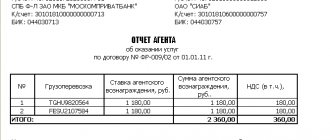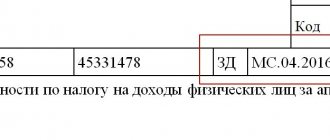Tax legislation is structured in such a way that not only the taxpayer himself, but also other persons who are entrusted with certain “intermediary” responsibilities can be found guilty of committing a crime related to taxation. Such persons are called tax agents, and it is their duties and the degree of responsibility for their failure that will be discussed in this article.
Punishment for failure to fulfill the duties of a tax agent.
What does the Tax Code say?
Clause 5 of Art. warns about liability for failure to fulfill the duties of a tax agent. 24 Tax Code of the Russian Federation. The basis for this is the discovery of a violation and the entry into force of the tax authority’s decision (clause 3 of Article 108 of the Tax Code).
The amount of punishment for a tax agent is discussed in more detail in Art. 123 of the Tax Code of the Russian Federation: if the tax amount was not withheld and/or not paid on time (or was withheld and not paid in full), then the fine will be 20% of the amount that the agent should have withheld and contributed to the budget (clause 1 of Article 123 of the Tax Code) . If a person has already been held accountable for a similar violation within 1 year, the fine is doubled (clause 4 of Article 114 of the Tax Code).
In addition, in the absence of a 6-NDFL calculation or a declaration, for example, for VAT, the Federal Tax Service has the right to block the tax agent’s current account.
Tax liability
The duties of a tax agent for personal income tax imply that he must calculate, withhold from the taxpayer and pay the amount of tax to the budget (clause 1, clause 3, article 24, clause 1, article 226 of the Tax Code). Personal income tax is calculated on a monthly accrual basis for all employee income taxed at rate 13, accrued from the beginning of the tax period (clauses 1, 3, article 210, article 216 of the Tax Code). In this case, a credit is provided for the tax withheld for previous months (clauses 2, 3, Article 226 of the Tax Code). At the same time, personal income tax is subject to withholding directly from taxpayers’ income upon their actual payment (paragraph 1, paragraph 4, article 226 of the Tax Code). Considering that, in general, the date of actual receipt of income for personal income tax purposes is the day of their payment (transfer to an account) in cash and transfer in kind, in fact, it is necessary to calculate the tax with each payment of income (clause 1 of Article 223 of the Tax Code) . Moreover, the tax agent is obliged to transfer personal income tax to the budget no later than the day of actual receipt of cash from the bank for the payment of income, as well as the day of transfer of income from the accounts of tax agents in the bank to the accounts of taxpayers or, on their instructions, to the accounts of third parties in banks (para. 1 clause 6 of article 226 of the Tax Code).
Separately for each amount of income, personal income tax is also calculated on payments taxed at rates other than the rate of 13 percent (clause 3 of Article 226 of the Tax Code). Failure of a tax agent to fulfill the duties assigned to him entails liability under Art. 123 Tax Code. To be more precise, this provision establishes penalties for unlawful non-withholding and (or) non-transfer (incomplete withholding and (or) transfer) of tax amounts within the prescribed period. However, it is obvious that non-calculation of personal income tax entails its non-withholding and, as a consequence, non-payment. The amount of sanctions in this case is 20 percent of the amount of tax subject to withholding and (or) transfer. Note! Tax inspectors have the right to hold a tax agent accountable under Art. 123 of the Tax Code, including until the end of the tax period, which, if we talk about personal income tax, is considered a year. This conclusion was reached by the Presidium of the Supreme Arbitration Court of the Russian Federation in Resolution No. 1051/11 of July 5, 2011. As the judges emphasized, the duties of a tax agent regarding the terms of withholding and transferring personal income tax to the budget are provided for in Art. 226 of the Code and are not related to the end of the tax period.
It should be noted that in arbitration practice there are examples of decisions in which judges indicate that tax authorities do not have the right to hold a tax agent accountable if the personal income tax was paid by him at a later date, on the date of the start of the on-site audit it was already transferred in full (Resolutions of the Federal Antimonopoly Service of the Moscow District dated April 5, 2011 N KA-A40/1966-11, FAS North Caucasus District dated February 17, 2011 in case N A32-15885/2010, FAS East Siberian District dated April 29, 2008 N A19-13815 /07-41-F02-1664/08, Federal Antimonopoly Service of the West Siberian District dated February 10, 2009 N F04-643/2009(48-A45-46)). However, it must be taken into account that all of them considered periods when the previous version of Art. 123 of the Tax Code, which established liability only for non-transfer (incomplete transfer) of tax, but not for paying it at a later date. However, according to the current version of this article, which came into force on September 2, 2010, the penalties provided for by it apply, among other things, in the event of failure to remit tax on time. As for representatives of the Federal Tax Service, tax department experts have previously insisted that responsibility under Art. 123 of the Tax Code is also subject to application in case of late payment of tax subject to withholding by the tax agent to the budget (Letter of the Federal Tax Service of Russia dated February 26, 2007 N 04-1-02 / [email protected] ).
In what cases can punishment be avoided?
If the violating tax agent has mitigating circumstances, the amount of the fine is reduced by at least 2 times (clause 3 of Article 114 of the Tax Code of the Russian Federation).
Read also: Petition to the tax office to reduce the amount of the fine
Penalties for untimely withholding and remittance of tax can be completely avoided if all the following conditions are simultaneously met (clause 2 of Article 123 of the Tax Code):
- the tax calculation was submitted to the Federal Tax Service on time;
- the reporting form contains all information in full, without errors or understatements of the tax base;
- the entire tax amount is transferred to the budget (along with any penalties due) until the error is discovered by the tax authorities or until an on-site audit is scheduled.
The tax agent can independently correct errors in reporting by submitting updated documents to the Federal Tax Service as soon as he discovers inaccuracies in the previously submitted information.
Penalties for late payment
Payment of tax at a later date than provided for by law, as provided for in Art. 75 of the Tax Code, among other things, risks the taxpayer paying a penalty for each day of delay. Meanwhile, according to paragraph 7 of this article, the rules established by it also apply to tax agents. Moreover, the amount of penalties can be collected from the tax agent even in the case when personal income tax is not withheld from the income of an individual for one reason or another, that is, at the expense of the agent’s own funds (Resolution of the Presidium of the Supreme Arbitration Court of the Russian Federation of January 12, 2010 N 12000/09 , dated May 22, 2007 N 16499/06, Letter of the Federal Tax Service of Russia dated July 25, 2006 N BE-6-04 / [email protected] ).
Note! Payment of personal income tax at the expense of the tax agent’s own funds is expressly prohibited by clause 9 of Art. 226 Tax Code. In this regard, tax authorities do not have the right to recover from the tax agent the tax that he did not withhold from the taxpayer (Resolutions of the Federal Antimonopoly Service of the Volga District dated July 23, 2009 N A57-5229/2008, FAS Moscow District dated July 28, 2009 N KA-A40 /6948-09). However, for the same reason, tax inspectors do not recognize the duties of a tax agent as fulfilled if personal income tax is transferred to them at their own expense.
At the same time, as follows from the Letter of the Federal Tax Service of Russia dated December 29, 2012 N AS-4-2/22690, in the event of payment by a tax agent of the due amounts of taxes at a later date, penalties are subject to accrual for the entire organization (entrepreneur) taking into account the date of receipt income of each individual and the terms of personal income tax withholding for each individual. It should be noted here that according to paragraph 1 of Art. 230 of the Tax Code, tax agents are required to keep records of income received from them by individuals in the tax period, tax deductions provided to them, as well as calculated and withheld amounts of taxes in tax registers for each taxpayer. It is quite clear that in the absence of such accounting, calculating the amount of penalties is quite problematic, but not impossible. It should be remembered that in this case Art. 120 of the Code, which provides for liability for gross violation of the rules for accounting for income and (or) expenses and (or) taxable items (Letter of the Federal Tax Service of Russia dated December 29, 2012 N AS-4-2/22690).
Depending on the severity of the offense, penalties under Art. 120 of the Tax Code vary. So, if a gross violation of accounting rules is committed within one tax period, then the amount of the fine will be 10,000 rubles. (Clause 1 of Article 120 of the Tax Code). The same acts, extending over more than one tax period, already threaten sanctions in the amount of 30,000 rubles. (Clause 2 of Article 120 of the Tax Code). And, finally, if they entailed an understatement of the tax base, then the amount of the fine will depend on the amount of tax not paid to the budget (20 percent, but not less than 40,000 rubles) (clause 3 of Article 120 of the Tax Code).
Failure to fulfill the duties of a tax agent for personal income tax
When paying income to employees and other individuals, the tax agent, in addition to withholding personal income tax and transferring tax to the budget, must submit to the Federal Tax Service a quarterly form 6-NDFL, as well as a 2-NDFL certificate at the end of the year for each taxpayer.
Sanctions for violations for personal income tax agents are as follows:
- If the 2-NDFL certificates are not submitted to the Federal Tax Service within the prescribed period, the fine will be 200 rubles for each document not submitted (clause 1 of Article 126 of the Tax Code of the Russian Federation).
- If the 6-NDFL report is submitted after the deadline, a fine will be imposed in the amount of 1000 rubles for each overdue month, full or incomplete (clause 1.2 of Article 126 of the Tax Code of the Russian Federation).
- If false information is found in the documents submitted by the agent (accidentally or intentionally), the agent will be fined 500 rubles for each such document (Clause 1 of Article 126.1 of the Tax Code of the Russian Federation).
- For untimely submission or refusal by an agent to submit information to the Federal Tax Service for tax control, an administrative fine of 300 to 500 rubles may be collected from the official (Article 15.6 of the Administrative Code).
Who is a tax agent
Withholding occurs when the tax agent transfers a certain amount of money to the taxpayer, for example, wages, remuneration for services or dividends. Thus, the tax agent is a creditor in relation to the taxpayer, and tax is withheld when repaying accounts payable.
The relevant chapters of the Tax Code talk about the payment of what amounts, the creditor becomes a tax agent. The most common cases include the following. Issuance of wages to employees (in this situation, the employer is obliged to withhold personal income tax (Article 226 of the Tax Code of the Russian Federation)). Payment of income to a foreign organization (the source of payment must withhold income tax (Article 310 of the Tax Code of the Russian Federation)).
We suggest you familiarize yourself with: Real estate tax deduction after how many years
Transfer of rent for the use of federal, regional or municipal property (the tenant is obliged to withhold VAT (Article 161 of the Tax Code of the Russian Federation)). And the transfer of dividends to the founder (the company must withhold income tax (Article 275 of the Tax Code of the Russian Federation)). The Tax Code provides for other situations when the creditor acts as a tax agent.
Let us add that tax agents have the same rights as taxpayers. In addition to rights, tax agents also have responsibilities: keep records of amounts paid and taxes withheld, provide inspectors with documents on these payments and withholdings, etc. Failure to fulfill the obligation to withhold and transfer tax is subject to a fine under Article 123 of the Tax Code of the Russian Federation.
Criminal liability
Failure to fulfill the assigned duties of a tax agent for personal interests is considered a crime. Types of this crime include:
- failure to calculate the amount of tax;
- failure to withhold funds from the taxpayer;
- failure to transfer payments to the budget.
By law, any of these acts may be considered a tax offense. But failure to fulfill the duties of a tax agent constitutes a crime if it:
- committed for personal gain;
- there is direct intent of the perpetrators;
- is associated with the misappropriation of funds in one’s own favor and/or in favor of third parties;
- committed on a large or especially large scale.
Large amount – tax amount is more than 5 million rubles. for a period of 3 consecutive years, provided that the share of funds not paid/withheld by the agent is more than 25%, or more than 15 million rubles. Particularly large amount, when the share of taxes not withheld/unpaid by the agent amounted to more than 50% of the total amount of such taxes for 3 years (for taxes exceeding 15 million rubles), or in general equal to more than 45 million rubles. (Note 1 to Article 199.1 of the Criminal Code of the Russian Federation).
Responsibility rests with the identified guilty official(s).
According to the Criminal Code of the Russian Federation, failure to fulfill the duties of a tax agent can be punished much more severely.
Is it possible to collect arrears and penalties from a tax agent?
If the tax is not withheld, then the inspectors are allowed to collect only a penalty from the tax agent. At the same time, the period for which penalties are accrued is strictly limited. The beginning of the period is the date when the tax agent should have withheld and transferred the tax to the budget. The end of the period is the date when the obligation to pay tax passes to the taxpayer himself.
There is one exception here. A tax agent who fails to withhold tax on income paid to a foreign person may be charged both a penalty and a tax. Moreover, the period for calculating penalties is not limited. Simply put, tax authorities will calculate penalties from the date when the tax should have been withheld and paid until the date of actual payment.
Certificate 2-NDFL did not pass format control - is the fine legal?
Tax agents submit to the tax authority at the place of their registration information on the income of individuals for the expired tax period and the amounts accrued, withheld and transferred to the budget system of the Russian Federation for this tax period of taxes annually no later than April 1 of the year following the expired tax period, in the form formats and in the manner approved by the federal executive body authorized for control and supervision in the field of taxes and fees (clause 2 of Article 230 of the Tax Code of the Russian Federation).
If the number of employees of the company who received income exceeds 25 people, information in form 2-NDFL is submitted via telecommunication channels, in electronic form (clause 2 of Article 230 of the Tax Code of the Russian Federation).
The procedure for submitting information about the income of individuals, including in electronic form via telecommunication channels, was approved by Order of the Federal Tax Service of the Russian Federation dated September 16, 2011 No. ММВ-7-3/ [email protected] “On approval of the procedure for submitting information about income of individuals and messages about the impossibility of withholding tax and the amount of personal income tax" (hereinafter referred to as the Procedure).
The date of submission of information is considered to be the date of sending, recorded in confirmation of the date of sending in electronic form via telecommunication channels of a specialized telecommunications operator or tax authority (clause 4 of the Procedure).
Fine for false information in certificate 2-NDFL
Starting from January 1, 2020, the submission by a tax agent of certificates in Form 2-NDFL containing false information will entail a fine of 500 rubles for each submitted certificate containing such information (clause 1 of Article 126.1 of the Tax Code of the Russian Federation).
Tax legislation does not operate with the concept of “unreliable information”. This gap is filled by explanations from tax authorities (Letters of the Federal Tax Service of the Russian Federation dated November 1, 2016 No. BS-4-11/20817, dated August 9, 2016 No. GD-4-11/14515, Ministry of Finance of the Russian Federation dated April 21, 2016 No. 03- 04-06/23193).
Important!
According to tax authorities, any completed information in Form 2-NDFL that does not correspond to reality can be classified as unreliable. These could be any errors made by the tax agent when filling out the relevant details (for example, in the taxpayer’s personal data, income and deduction codes, totals, etc.).
The list of information that relates to personal data is given in Art. 3 of the Federal Law of July 27, 2006 No. 152-FZ “On Personal Data” (hereinafter referred to as Law No. 152-FZ).
Personal data is any information relating to a directly or indirectly identified or identifiable individual (Clause 1, Article 3 of Law No. 152-FZ).
Tax liability applies if an error is made in the indicators identifying individual taxpayers (TIN of an individual, last name, first name, patronymic, date of birth, passport details).
Before filing 2-NDFL for the year, tax officials recommend that the tax agent update the personal data of employees (Letter of the Federal Tax Service of the Russian Federation dated November 1, 2016 No. BS-4-11/20817).
The most common errors that lead to unreliable 2-NDFL information are TIN and deduction codes.
3.1. Errors in indicating employees' tax identification numbers
Section 2 of the certificate “Data about the individual - the recipient of the income” must reflect information, including the last name, first name, patronymic, as well as the TIN of the individual, the recipient of the income. This information is required to be filled out in accordance with Section IV of the Procedure.
If the tax agent incorrectly indicates the employee’s TIN in the 2-NDFL information provided, the tax agent faces a fine of 500 rubles (Letter of the Ministry of Finance of the Russian Federation dated June 30, 2016 No. 03-04-06/38424, Federal Tax Service of the Russian Federation dated February 11, 2016 No. BS-4-11/ [email protected] ).
In practice, there are situations when the employer does not have information about the employee’s TIN. In this situation, you cannot fill in the TIN with arbitrary numbers (in this case the company will be fined), but it is better to leave the TIN field blank (Letter of the Ministry of Finance of the Russian Federation dated April 21, 2016 No. 03-04-06/23193). If the company enters zeros in the TIN field, then a fine is also possible (Letter of the Federal Tax Service of the Russian Federation dated February 11, 2016 No. BS-4-11 / [email protected] ).
Payment of personal income tax by individuals
Citizens are also required to pay tax on their personal income that they receive during non-working hours. This could be renting out real estate or a car, or receiving dividends. Income from rent is also subject to personal income tax. Products, goods, medicines, payment for treatment that a citizen receives under an annuity agreement are considered his income in kind. Therefore, the annuitant must pay tax at the end of the year.
When purchasing an apartment, a citizen is required to pay personal income tax if he received a subsidy from the organization in which he works. If you receive a subsidy from budget funds, for example, from the Housing and Mortgage Fund, the tax is not paid on the basis of clause 36 of Art. 217 NK.
A citizen can enter into a civil contract with an organization to provide it with services or perform any work. In this case, both the customer and the contractor can pay personal income tax; this must be specified in the contract.
To pay the tax, a citizen must submit a declaration in form 3-NDFL by April 30 of the next year and no later than July 15 transfer an amount of 13% of the income received.
If the inspection reveals non-payment, the individual will have to pay tax, penalties and a fine for failure to submit a declaration in the amount of 5% of the amount payable, but not less than 1,000 rubles.









